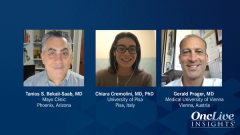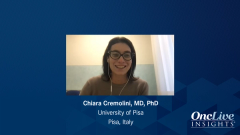
Sequencing Therapy for Relapsed mCRC
Gerald Prager, MD, leads the discussion on sequencing strategies for patients with relapsed mCRC, including those not previously treated with anti-EGFR inhibitors.
Episodes in this series

Tanios S. Bekaii-Saab, MD: Gerald, I’m going to go through the next discussion with you and then Chiara. I know this is the standard in Europe, but what if this patient did not receive an anti-EGFR inhibitor in the first or second line, or at least not in the first line, possibly the second line? We had these data from Japan that were very intriguing, although the study got cut short. We’re trying to produce that in the United States with REVERCE too. Let’s set regulatory instances aside. Would you ever consider the REVERCE strategy?
Gerald Prager, MD: Yeah, the REVERCE strategy is for sure hypothesis generating. Keep in mind that the randomized prospective clinical trials of anti-EGFR antibodies in later lines did fulfill the end point in improving progression-free survival, but never significantly over survival. Keeping this in mind, I would rather go for regorafenib first and then a cetuximab concept, which is also reflected in the REVERCE study. This is a hypothesis. It’s not proven, but regorafenib is somehow immunomodulating. If you start with an anti-EGFR antibody, later after regorafenib, you might have a better effect if you do sequence regorafenib first and then cetuximab in this particular scenario.
Tanios S. Bekaii-Saab, MD: Interesting. I understand that the concept of rechallenge and reintroduction are a bit different. Rechallenge means you failed the chemotherapy and then you try your luck. With reintroduction, you’re bringing it back because it never failed. Do you ever consider the options of rechallenge or reintroduction? Do you do it before you go through regorafenib and TAS-102 [tipiracil], or is this your last line, your Hail Mary?
Chiara Cremolini, MD, PhD: In general, I don’t do much chemotherapy rechallenge. I will say 0%. Chemotherapy reintroduction in the absence of a nontreatment progression—yes, I sometimes go for this option. It mainly happens after regorafenib, or trifluridine-tipiracil, especially for patients who’ve been on treatment with chemotherapy-based regimens for long because the burden of adverse events from a chemotherapy combination in advance lines of therapy is not negligible. This is why I’m not a big fan of this kind of treatment option. Having more free time with a chemotherapy-free interval may be beneficial to let this treatment work again at a later stage. We also know that these advanced-line treatments—trifluridine, tipiracil, and regorafenib—work better if we use them in early lines of treatment. Otherwise, we risk to miss this opportunity if we postpone their use too much. The funnel of the percentage of patients able to receive further lines of therapies is lower and lower in third, fourth,fifth lines of treatment.
Tanios S. Bekaii-Saab, MD: Great. This was a fantastic discussion.
Transcript Edited for Clarity









































